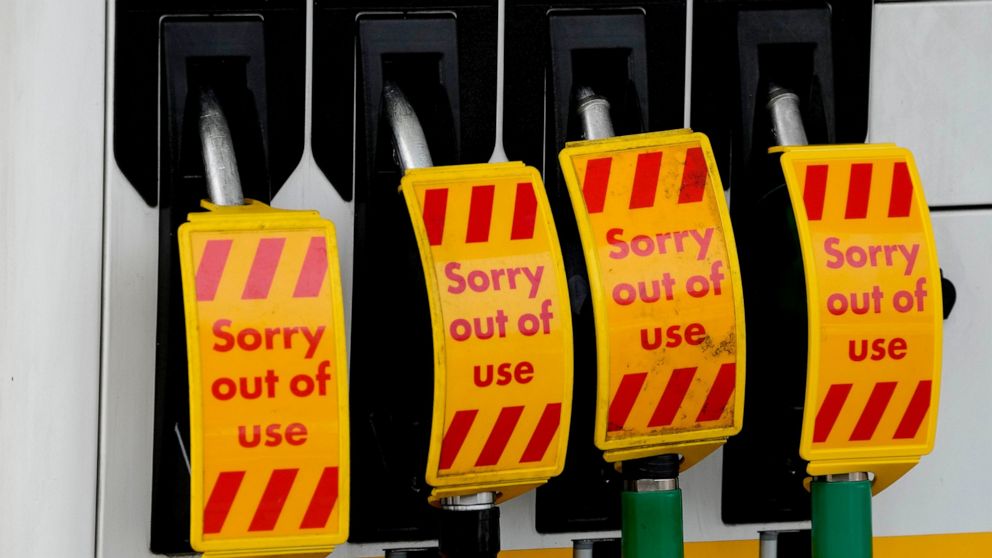With army on standby, Johnson says UK fuel crisis improving
LONDON — Prime Minister Boris Johnson sought to reassure the British public Tuesday that a fuel-supply crisis snarling the country was “stabilizing,” though his government said it would be a while before the situation returns to normal.
Johnson’s government has put army troops on standby to help distribute gasoline and help ease a fuel drought, triggered by a shortage of truck drivers, that has drained hundreds of pumps and sent frustrated drivers on long searches for gas.
“We now are starting to see the situation improve,” Johnson said in a televised interview. “On the forecourts, the situation is stabilizing, and people should be confident and just go about their business in the normal way.”
The Petrol Retailers Association also said there are “early signs” the fuel crisis was ending.
Many gas stations around Britain shut down in the past five days after running out of fuel, a situation exacerbated by panic buying among some motorists. Long lines of vehicles have formed at pumps that are open, with tempers fraying amid hourslong waits.
The crisis has brought calls from heath care organizations and teachers’ groups for essential workers to be given priority for fuel supplies.
“We can’t be waiting two or three hours in a queue for fuel when we have patients to see,” David Wrigley, deputy chairman of the British Medical Association, told Times Radio.
Geoff Barton, general secretary of the Association of School and College Leaders, said the crisis was so far causing worry, but not major disruption, for educators who are already grappling with the effects of the coronavirus pandemic.
“We very much hope the situation is resolved rapidly before it causes disruption,” he said. “There is the option for remote education, which schools and colleges have shown themselves to be very adept at providing through the pandemic, but this is very much a last resort and they will be hoping it doesn’t come to that.”
The supply problems stem from a shortage of as many as 100,000 truck drivers, due to a perfect storm of factors including pandemic-related disruption to driver training, an aging workforce and an exodus of foreign workers following Britain’s departure from the European Union last year.
While other countries, including the United States and Germany, also are experiencing a shortage of truck drivers, the problem has been especially visible in Britain, where it has contributed to empty supermarket shelves and shuttered gas pumps.
That’s partly due to Brexit. Post-Brexit immigration rules mean EU citizens can no longer live and work visa-free in Britain, as they could when the U.K. was a member of the bloc.
The U.K.’s Conservative government has been reluctant to acknowledge Brexit as a factor in the fuel crisis. Johnson said shortages of workers and goods were the result of surging demand as the pandemic eases and the economy revives.
But the government also announced that it would issue 5,000 short-term visas to foreign truck drivers to help ease the crisis in the run-up to Christmas. The number falls well short of what the industry says is needed, and critics argue the 3-month visas are too short to entice European truck drivers.
Nikolay Rashkov, who runs family-owned transport company Eurospeed in Bulgaria, expressed doubt that many Bulgarian drivers would be willing to go to Britain.
“At the beginning of the millennium, people from Eastern Europe — from Poland, Hungary, Romania and Bulgaria — went to Britain and filled the same gap that Britain is experiencing now,” he said. “But then came Brexit.”
Rashkov cited a combination of feeling unwelcome, high British taxes, steep rents and new red tape as deterrents to Eastern European drivers.
Johnson, who is strongly pro-Brexit, said that “uncontrolled immigration” was not the answer to Britain’s problems.
“We tried that for a long time — 20 years or so, perhaps longer,” the prime minister said. “And in the end, people could see that it was leading to a low-wage, low-skill approach without enough investment in people or in equipment, in capital.”
His televised statement showed the government seeking to calm the volatile fuel situation. The government argues that the crisis has been worsened by panic-buying, with people buying much more gas than they normally would because of fear of shortages.
“The system was just about coping until last weekend and it would have been capable of continuing to do so,” Transport Secretary Grant Shapps said. “Unfortunately, as we have seen with toilet rolls and other things, once people start to pursue a particular item, it can quickly escalate.”
———
Associated Press Writer Veselin Toshkov in Sofia, Bulgaria contributed.
![]()


